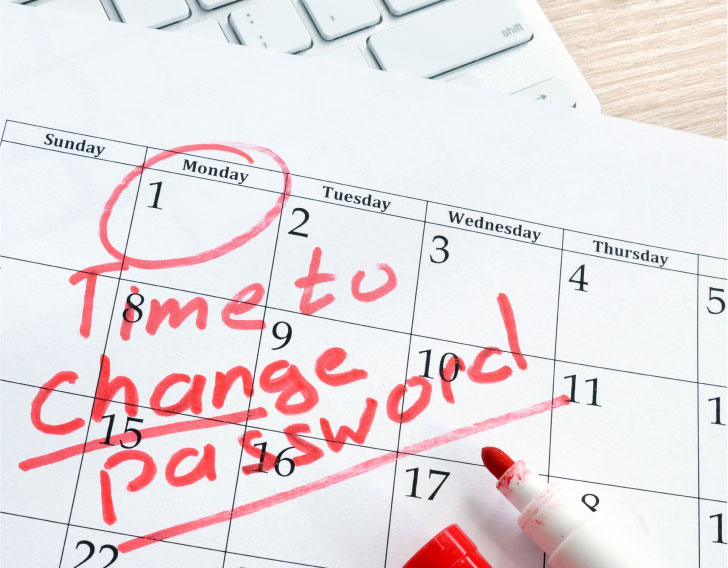Internet security
The Most Common Password Mistakes (and How to Avoid Them!)
Wouldn’t it be great if you never had to enter (or remember!) another password again?
Think of how much faster you could access your phone, emails, bank accounts and social media.
But there’s one problem.
You also have to consider how fast hackers and cybercriminals would be able to get into those items as well.
While we all may agree that passwords can be a major pain, they are a necessary evil that we’ll all be dealing with for the foreseeable future.
So, why don’t people take them more seriously?
Why it’s important to stay on top of your passwords
You hear it all the time. We live in an age where data breaches and identity theft are increasingly becoming a part of everyday life. Too many people don’t make password security a priority. It’s a big mistake, and it could end up costing them. The truth is that a strong password helps to protect your personal data against cybercriminals.Even if you take other online security measures, a weak or easily guessed password could put you at risk.
Think of your passwords as locks on the doors to personal aspects of your life. If the lock isn’t strong enough, thieves will find a way in. So, the more you take password security seriously, the more protected you will be.
There’s no better time than now to avoid common password mistakes and help prevent a disaster.
The most common mistakes made when creating passwords
The best way to prevent a problem is to be aware of what password mistakes you might make when creating or changing them.
Here are the most common password mistakes:
- Using personal information as part of a password – If you’re using a name, word or phrase that people associate with you as part of your passwords, such as a spouse’s name, kids or pets, it makes it easy for someone to guess. It’s too easy for a hacker to search social media or your name online and potentially decipher your password.
- Using the same password across multiple sites – If you have the same password for everything, you’re giving a hacker an invitation to access every account you have. Even though it may be cumbersome, it’s best to have a different password for every account or site you access. In fact, hackers assume that a password will be used for multiple sites since so many people make this mistake.
- Including common words or phrases in your password – Surprisingly, many people use the word ‘password’ as their password, which is way too easy for someone to guess. Another bad idea is using numbers in sequences, such as 12345678, pop culture phrases or any dictionary word. Hackers have access to programs that help them search thousands of words across multiple languages.
- Keeping a written list of passwords – A password should never be written down on paper as it isn’t secure. The information can easily be exposed, and you’ll likely discover the problem after it’s too late to stop it.
- Not including enough special characters or numbers – There’s a reason why sites are requiring passwords to include numbers or special characters. It makes the password unique as well as difficult to guess. While you can use characters as a substitute for letters, it’s still important to keep it complex. For example, passwords like S@lly123 or B*bby226 aren’t going to be strong enough to thwart a hacker.
- Sharing your password – It probably goes without saying that passwords shouldn’t be shared, yet so many people do. One suggestion is to set up a guest account for common services like internet access so that you won’t have to share your password with others temporarily staying in your home. Not securing your mobile device – A lost mobile device can be a nightmare if the right security precautions haven’t been taken. It could be an open invitation to your emails, social media and likely lots of financial information. It’s essential to take advantage of the security features on today’s devices, such as passcodes, fingerprints and facial recognition.
- Failing to change a password – Some experts suggest changing passwords at least once a year. The problem is most people keep the same password forever, and that makes it easier for them to get hacked. If you have multiple passwords and it’s too burdensome to change them that often, try to at least focus on those accounts containing the most sensitive information, such as bank or credit card accounts.
- Changing passwords too often – When people are forced to change their password often, it’s common for them to only make a minor change to the existing password. Changing only one letter or number makes it easier for people to guess, especially if they know your previous password. If a site or account asks you to change your password frequently, ensure you’re making enough changes to make it unique.
- Creating a password shorter than 10 characters – It used to be that a password was suggested to be 8 – 10 characters in length. Now, experts suggest that they should be at least 64 characters in length and a combination of letters, numbers, special characters and symbols.
- Making the password too complex – If you go too far with making your password unique, it may be easy for you to forget it. While this may be great for keeping out hackers, it will also be near impossible for you to memorize. It also may encourage you to write them down somewhere or save them as a note on your devices to help you remember.
How to safely manage your passwords
If you’ve read through the entire list above, you probably think that some items contradict others. And you would be right!
It’s virtually impossible for the average person to create a unique password that’s at least 64 characters and memorize it. That’s where a password manager can make all the difference!
Password managers like LastPass can securely store passwords all on one device. They are also instrumental in helping you create strong, unique passwords of 64 characters or more without the need to memorize them. You can keep your accounts secure and never worry about having to be locked out due to a forgotten password. All you need to remember is one password to access the program itself, and it does everything else for you.
AOL offers a variety of subscriptions like ID Protection by AOL, including LastPass and other services to help protect against identity theft.
Regardless of how you keep your passwords safe, it’s essential to remain vigilant. It’s becoming increasingly important to improve protections and security to remain safe as we rely more on spending and conducting so much of our lives online.
Keep these tips in mind as you create or change passwords to help keep the information you store online safe and secure.
Published on 06/06/2023


